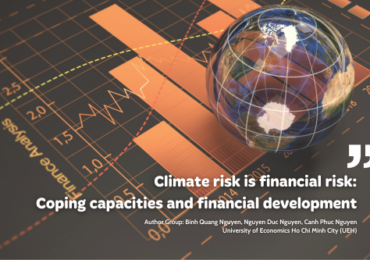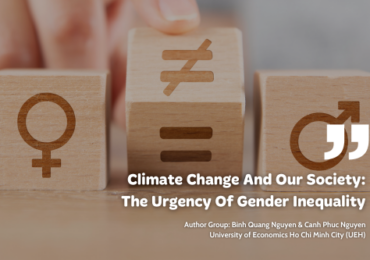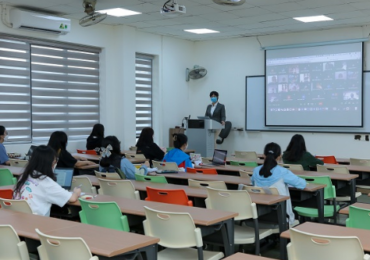[Podcast] Does the Financial Flexibility Prevent Stock Price Crash Risk during COVID-19 Crisis? Evidence from the Vietnamese Stock Market
16 July, 2024
Keywords: Financial flexibility, Stock price crash risk, COVID-19, Vietnam
Vietnam, like many other nations, has experienced the profound impacts of the pandemic on its financial markets, with increased volatility and uncertainties. Understanding how financial flexibility, encompassing factors such as liquidity management, debt resilience, and capital structure, influences stock price resilience is crucial for Vietnamese investors, businesses, and policymakers. Given the country’s reliance on various industries such as manufacturing and export, insights from this research can provide tailored strategies for firms to navigate the crisis, foster economic recovery, and enhance the stability of the Vietnamese stock market. Moreover, the findings may contribute to the development of targeted financial policies that promote resilience and sustainability in the face of future crises, thereby safeguarding the overall financial health of Vietnam’s economy.

Introduction
Stock price crash risk (SPCR) refers to the likelihood or probability of a significant and sudden decline in the prices of stocks or securities in a financial market (Dang & Nguyen, 2021). It represents the potential for a rapid and substantial decrease in the value of an individual stock, a specific sector, or even the overall market. It is for this reason that SPCR is a major concern for shareholders, investors, and regulators. Advancements in technology and the rise of algorithmic trading have led to increased concerns about SPCR (Nguyen & Dang, 2022). The use of automated trading systems and complex financial instruments can amplify market movements and potentially contribute to abrupt price declines McGroarty et al., 2019. In developing countries, the financial system is often fragile, and investor sentiment is strongly affected by market fluctuations (Yang et al., 2023). Therefore, it is vital to study SPCR in the context of developing countries.
In the context of countries and firms heavily affected by COVID-19 Almustafa et al., 2023, the stock markets in countries around the world fluctuated greatly during the COVID-19 pandemic. Harjoto et al. (2021) found that COVID-19 caused a negative shock to the global stock markets, especially in emerging markets and for small firms. Contessi and De Pace (2021) provide evidence that the collapses in the stock markets of 18 major countries during the first wave of the COVID-19 pandemic of 2020. Therefore, policymakers as well as shareholders in most countries, especially emerging countries, are trying to find solutions to limit SPCR in response to possible pandemics in the future.
Financial flexibility and SPCR
Previous studies, conducted from multiple perspectives, have agreed that financial flexibility can make firms more stable. According to DeAngelo et al. (2011), the primary aim of managerial financial strategies is to ensure that the company maintains its ability to acquire capital from the market, particularly in situations involving unanticipated cash flow shortages or investment prospects. It was discovered that companies frequently opt to issue temporary debt or equity, which may result in temporary deviations from their intended long-term capital structure. This approach is adopted to prepare for unforeseen external factors that may disrupt the company’s cash flow requirements, as these factors are typically beyond the control of companies and difficult to predict. Moreover, the study indicates that companies engaging in proactive equity issuances are typically in good financial health; they have low leverage, unused debt capacity, and substantial cash balances. These companies create confidence among investors, thereby avoiding large fluctuations in stock prices. Fundamentally, financial flexibility provides managers with the ability to effectively manage unpredictable cash flow requirements while also enabling firms to optimize their inherent growth opportunities. Given its significant impact on value creation, financial flexibility plays a crucial role in explaining why changes in a company’s financial flexibility should be factored into stock market pricing.
Moreover, agency theory posits that managers have incentives to act in their own self-interest rather than maximizing shareholder wealth. However, firms with higher financial flexibility are less dependent on external financing and have greater freedom to make optimal investment decisions during crises, reducing agency conflicts that can negatively impact stock prices. Based on agency theory, previous studies have agreed that insiders always want to increase the private capture of the cash flow of their firm. Jin and Myers (2006) argue that the lack of transparency and information asymmetry in firms allows insiders to decrease the flow of information to the market, thereby raising the risk of stock market crashes.
Financial flexibility and the impact of the COVID-19 crisis on SPCR
The pecking order theory suggests that firms have a preference for internal financing over external financing (Myers, 1984). This theory implies that companies with strong internal financial resources and a financial flexibility strategy are better positioned to navigate economic downturns and maintain their stock prices. Gamba and Triantis (2008) found that firms adopting the financial flexibility strategy are able to avoid financial distress in the face of negative shocks. Similarly, Fahlenbrach et al. (2021) investigated the role of financial flexibility of firms during the COVID-19 crisis and found that companies in a particular industry that possess strong financial flexibility encounter a 26% decrease in their stock prices—equivalent to a reduction of 9.7 percentage points—compared to companies with low financial flexibility.
In this study, we argue that financial flexibility can mitigate the effect of the COVID-19 crisis on SPCR through several mechanisms. First, firms with higher financial flexibility are better positioned to absorb unexpected shocks and maintain their operations during crises. This resilience can instill confidence in investors and reduce the likelihood of panic selling, leading to lower SPCR. Second, financially flexible firms can take advantage of strategic opportunities that arise during a crisis, such as acquiring distressed assets or investing in innovative solutions (Arslan-Ayaydin et al., 2014). These proactive actions can signal resilience to investors and positively impact stock prices. Finally, during the COVID-19 crisis, firms faced difficulties in accessing external financing (Almustafa et al., 2023). However, financially flexible companies with ample cash reserves or available credit lines could navigate these constraints more effectively, mitigating the negative impact on their stock prices.
Conclusion
We conducted an analysis using a dataset comprising 645 non-financial listed firms in the Vietnamese stock market. Our findings revealed a significant negative association between financial flexibility and SPCR in the Vietnamese stock market. Firms with higher levels of financial flexibility experience lower probabilities of stock price crashes, indicating the crucial role of financial flexibility in safeguarding firm value and investor interests. Furthermore, our results demonstrated that financial flexibility diminishes the positive effect of COVID-19 on SPCR, suggesting that firms with greater financial flexibility are better positioned to withstand the challenges imposed by the pandemic. Overall, this research contributes to the literature by providing empirical evidence on the role of financial flexibility in reducing stock price crash risk and moderating the impact of COVID-19 on stock price crash risk in the context of Vietnam. It offers valuable insights into the mechanisms through which firms can enhance their resilience and protect shareholder value during periods of heightened uncertainty and crisis.
Please refer to the full paper “Does the Financial Flexibility Prevent Stock Price Crash Risk during COVID-19 Crisis? Evidence from the Vietnamese Stock Market” HERE.
Author Group: Nguyen Quang Khai, Dang Van Cuong – University of Economics Ho Chi Minh City (UEH)
This is an article in the series of articles spreading research and applied knowledge from UEH with the “Research Contribution For All” message, UEH cordially invites dear readers to look forward to the upcoming Knowledge Newsletter ECONOMY No. #119

References
Almustafa, H., Nguyen, Q. K., Liu, J., & Dang, V. C. (2023). The impact of COVID-19 on firm risk and performance in MENA countries: Does national governance quality matter? PloS one, 18(2), e0281148.
Arslan-Ayaydin, Ö., Florackis, C., & Ozkan, A. (2014). Financial flexibility, corporate investment and performance: evidence from financial crises. Review of Quantitative Finance and Accounting, 42, 211-250.
Contessi, S., & De Pace, P. (2021). The international spread of COVID-19 stock market collapses. Finance Research Letters, 42, 101894.
Dang, V. C., & Nguyen, Q. K. (2021). Internal corporate governance and stock price crash risk: evidence from Vietnam. Journal of Sustainable Finance & Investment, 1-18. doi:10.1080/20430795.2021.2006128
DeAngelo, H., DeAngelo, L., & Whited, T. M. (2011). Capital structure dynamics and transitory debt. Journal of financial economics, 99(2), 235-261.
Fahlenbrach, R., Rageth, K., & Stulz, R. M. (2021). How valuable is financial flexibility when revenue stops? Evidence from the COVID-19 crisis. The Review of Financial Studies, 34(11), 5474-5521.
Gamba, A., & Triantis, A. (2008). The value of financial flexibility. The Journal of Finance, 63(5), 2263-2296.
Harjoto, M. A., Rossi, F., & Paglia, J. K. (2021). COVID-19: Stock market reactions to the shock and the stimulus. Applied Economics Letters, 28(10), 795-801.
Jin, L., & Myers, S. C. (2006). R2 around the world: New theory and new tests. Journal of financial economics, 79(2), 257-292.
McGroarty, F., Booth, A., Gerding, E., & Chinthalapati, V. R. (2019). High frequency trading strategies, market fragility and price spikes: an agent based model perspective. Annals of Operations Research, 282, 217-244.
Myers, S. C. (1984). Capital structure puzzle: National Bureau of economic research Cambridge, Mass., USA.
[Podcast] Recommendations for University education development
14 February, 2025
[Podcast] Developing Vung Tau into a World-Class Tourism City
16 January, 2025
[Podcast] Postdigital Design Strategies for Media Art
6 January, 2025
[Podcast] NFTs – Artistic Innovation or Just a New Hype?
27 December, 2024
[Podcast] Boosting Employee Creativity with Constructive Feedback
23 November, 2024
[Podcast] “Dutch Disease” in Remittances and the Case of Vietnam
4 November, 2024
[Podcast] Latest approaches for sustainable universities
11 July, 2024
Data Law – Part 1: Necessity for a New Approach
18 May, 2024
Advertising Evaluation on Tiktok Platform
14 May, 2024
[Podcast] Advertising Evaluation on Tiktok Platform
13 May, 2024
Promoting Learner Autonomy in English Language Learning (Part 1)
24 November, 2023
ArtTech And Sustainable Development
27 October, 2023
Motivation of EFL Vietnamese Students in Economics-related Majors
12 October, 2023
Climate Change And Our Society: The Urgency Of Gender Inequality
12 October, 2023
People Analytics in Vietnam
10 March, 2022
Revolution in Experimental Economics
30 January, 2022
The Sharing Economy: Governance Issues in Vietnam
24 January, 2022
Employment Policy For Ho Chi Minh City in Post-social distancing Period
28 December, 2021
Lifelong learning at UEH: Towards a Sustainable University
28 December, 2021
Building a Decentralized Stock Market based on Blockchain Technology
24 December, 2021
Consumer price index from big data mining perspective (Big data)
17 November, 2021
Overview Of Digital Currency – Part 5: DIEM Private Stabilized Currency
11 November, 2021















































































































































